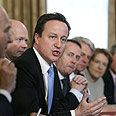
EU imposes tougher sanctions on Iran
'Hard-hitting' measures go substantially beyond those approved by UN, to focus on trade, banking, insurance and key sectors of gas and oil industry. Russia 'extremely disappointed'
European Union leaders agreed tighter sanctions against Iran on Thursday, including measures to block oil and gas investment and curtail its refining and natural gas capability.
The measures, which go substantially beyond those approved by the United Nations on June 10, are designed to pressure Tehran to return to talks on its uranium enrichment program which Western powers believe is designed to produce nuclear weapons.
British Prime Minister David Cameron said Thursday that Europe needed to play a full role in the international effort to deal with Iran's nuclear program.
This means "making sure that we have a strong package of sanctions against Iran," he said. "We believe it is incredibly important."
Russia sharply criticized the EU and the United States for imposing additional sanctions on top of those that Moscow agreed to support in the UN Security Council last week.
"We are extremely disappointed that neither the United States nor the European Union is heeding our calls to refrain from such steps," Russian news agencies quoted Deputy Foreign Minister Sergei Ryabkov as saying.
The steps, which could come into force within weeks, will focus on trade, banking and insurance, transport including shipping and air cargo, and key sectors of the gas and oil industry.
The energy sector sanctions will prohibit "new investment, technical assistance and transfers of technologies, equipment and services related to these areas, in particular related to refining, liquefaction and liquefied natural gas technology", the heads of state and government said in their statement, issued during an EU summit in Brussels.
The measures, drawn up in discussions over the past week, go beyond what some diplomats had foreseen and are likely to put strong financial pressure on Iran, which is the world's fifth largest crude oil exporter but has little refining capability.
'New restrictive measures inevitable'
However, diplomats acknowledged that the strength and effects of the sanctions would depend on the work done by EU foreign ministers over the next month to work out how they will be imposed and to ensure compliance.
"It's a question of scope," said one diplomat. "The measures in principle are good, they are hard-hitting. But it will depend what is worked out on implementation in the next month, that will determine how much of an impact they will have."
Another described the measures as "potentially a big stick", but it would depend on how it was wielded when the time came.
In their statement, the EU heads of state said time was running out on Iran and further action needed to be taken.
"The European Council deeply regrets that Iran has not taken the many opportunities which have been offered to it to remove the concerns of the international community over the nature of the Iranian nuclear program," the EU leaders said.
"Under these circumstances, new restrictive measures have become inevitable."
Diplomats said some EU states, notably Germany which has large investments in Iran's oil and gas sector, had concerns about strengthening the sanctions, but in the event all EU members moved quickly behind the strongly worded statement.
Iran denies its nuclear program is aimed at producing weapons, saying it is for energy and other peaceful purposes.
The EU steps coincided with efforts by the US Congress to draw up its own set of additional measures against Iran designed to add bite to last week's UN sanctions package, parts of which were watered down by Russian and Chinese opposition.
The US Treasury on Wednesday blacklisted another state-controlled Iranian bank and targeted companies that is says are fronts for Iran's state shipping company IRISL as it looked to coordinate the tighter sanctions net with the EU.
An oil industry source said that, as a result of the UN sanctions, Kazakhstan and Turkmenistan might redirect their oil exports through Russia rather than shipping them to Iran.
Iran has swap arrangements with Central Asian producers under which it imports crude oil into Caspian ports and supplies the equivalent barrels on behalf of its partners in the Persian Gulf.
Kazakhstan has been pumping oil to Iran at a rate of 1.2 million tons per year. Turkmenistan exports 2 million tons per year, but it is unclear how much goes to Iran.
Reuters and AP contributed to the report










